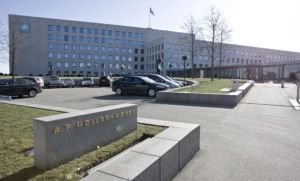News
Maersk to split into two divisions
This article is more than 9 years old.
Moving forward, the shipping and oil giant will have Transport & Logistics and Energy divisions

Maersk consolidating and streamlining (photo: Maersk)
The Danish shipping and oil giant Maersk revealed this morning that it will split into two separate divisions: Transport & Logistics and Energy.
Its units APM Terminals, Maersk Line, Svitzer, Maersk Container Industry and Damco will be consolidated in the Transport division, while Maersk Oil, Maersk Drilling, Maersk Tankers and Maersk Supply Services will be grouped in the Energy division.
“The industries in which we are operating are very different, and both face very different underlying fundamentals and competitive environments,” said Michael Pram Rasmussen, the board chairman of the Maersk Group.
“Separating our transport and logistics businesses and our oil and oil-related businesses into two independent divisions will enable both to focus on their respective markets. This will increase the strategic flexibility by enhancing synergies between businesses in Transport & Logistics, while ensuring the agility to pursue individual strategic solutions for the oil and oil-related businesses.”
READ MORE: Maersk to lay off 400 employees
Skou running the show
The move also means that Jakob Thomasen, the head of Maersk Oil, Kim Fejfer, the head of APM Terminals, and Trond Westlie, the head of finance for the Maersk Group, will all step down from their positions by the start of December.
Søren Skou will remain the group’s CEO and head of the Transport & Logistics division, while Claus Hemmingsen will become the new head of the Maersk Energy division and the group’s deputy president.
“Both Energy and Transport & Logistics have strategies positioning them for growth and strategic agility,” said Skou.
“Transport & Logistics will be able to provide new and digitalised world-class solutions for customers, while at the same time capture functional cost synergies and better utilisation of existing assets. Energy is well positioned to leverage Maersk Oil’s expertise and gain scale in select geographies, particularly in the North Sea. Its structural agility will enable management to pursue new and different structural solutions and investment.”










































